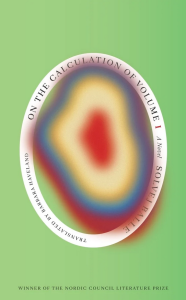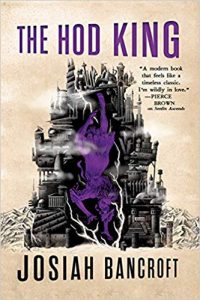On the Calculation of Volume I by Solvej Balle: Review by Jake Casella Brookins
 On the Calculation of Volume I, Solvej Balle (New Directions 978-0-81123-725-3, 160pp, $15.95, tp) November 2024.
On the Calculation of Volume I, Solvej Balle (New Directions 978-0-81123-725-3, 160pp, $15.95, tp) November 2024.
In Solvej Balle’s On the Calculation of Volume I, translated from the Danish by Barbara Haveland, rare book dealer Tara Selter has found herself trapped in a time loop on the 18th of November; the first entry in Balle’s septology begins with November 18 #121. For reasons unknown, time for her has “fallen apart”; she comes to think she’s hit some kind of rift in time, that she’s being carried by “times that had flooded their banks.” Her strange condition began while she was traveling for work but, unlike many loop protagonists, Tara herself does not “reset” each day – she’s still able to travel, to affect things in her immediate vicinity, and she decides to return home to her husband, Thomas. After a long sequence of beginning each morning by convincing Thomas what has happened and spending the day with him, Tara finds this grows too difficult, and moves into a new phase in which she carefully avoids him all day. Pondering, experimenting, keeping careful notes, Tara is a thoughtful looper, slowly devising plans and theories about her situation.
Balle’s combination of narrator and setup is quietly genius. On the Calculation of Volume is not about comic repetition in the style of Groundhog Day, more in tune with the uncertainty and uncanniness of something like Russian Doll. But Tara is also a protagonist who defies comparison to the usual time travel hero: half philosopher and half scientist, she’s a brilliant chronicler of her shifting thoughts and emotions, and of her strangely nonshifting world. Because she was away from home when the loop begins, Tara is denied a stable base from which to consider her situation: to be glimpsed in her home is to have explanations demanded of her. Thus, although trapped, she’s strangely unfixed, and part of the potency of On the Calculation of Volume is how well Balle, through Tara, is able to express the slow evolution of thought and personality that people are always going through. It’s as though the entire world has been set as the control variable so that this one mind can be observed. It’s quite the experiment, and astonishing how compelling it is, sentence by sentence and page by page.
Very early in the novel, one gets the strange feeling that there’s something ghostly about Tara’s secret life with her husband, although it’s hard to say who the ghost is: Tara has learned his every movement through the house, the little sounds of him using the kettle or brushing a banister with his arm, and builds her routines around staying out of his sight – a careful and covert dance in which each seems to be haunting the other. Later, when Tara discovers that the food she eats does not return to its original place the “next” day, she dubs herself a “monster” and Thomas the “ghost.” She is slowly devouring everything around her, while Thomas leaves no trace. It’s a strange and strangely intimate kind of haunting, something like an inverted version of Julio Cortázar’s “House Taken Over”, and a strange meditation on how relationships can change by their own inscrutable mechanics.
The anomalies that Tara discovers in the loop – food she eats stays missing from shelves, cupboards, and gardens; material objects she interacts with sometimes “stay” with her, sometimes vanish or return to their original positions – point towards one of my absolute favorite aspects of the novel, philosophically. On the Calculation of Volume eschews the cryptodualism of most loop stories, in which looping characters retain knowledge – in their brains! – despite a complete material reset, and instead insists on Tara’s materiality and continuity. The world here is not a video game to start over; it’s the real world, with something strange going on temporally, and Tara’s lived, physical journey is part of what it makes it so real and significant. Her hair and nails grow, a small wound on her hand heals and vanishes; presumably, although Balle has not, in this first volume, broached the topic, she could die. But beyond that, it’s the fact that she is still growing as a person that makes the book so compelling, coupled with her thoughtful reflections: “I have not found a way out of the eighteenth of November, but I found roads and paths through the day, narrow passages and tunnels I can move along. I cannot get out, but I can find ways in.”
On first description, one might doubt that a seven-volume story in this vein could work, but it only took a few sentences to convince me. Balle has nailed – and Haveland has ably translated – a remarkably believable, organic voice, a kind of quotidian existential mode that is equally suited to evocative descriptions of the world and to perceptive ruminations on the nature of time, relationships, and the self. Tara develops a keen sense of time, becomes something of a connoisseur and priestess of time, divining deeper patterns than the calendar – the way a breeze can carry a past or future season within it, the way that personal moods and phases are a kind of temporal climate. Tara has plans to get to November 19th, and I’m in for the journey, however many books it takes. The winner of the Nordic Council Literature Prize in its original publication, and this edition already longlisted for the National Book Awards for literature in translation, this is highly recommended.
Interested in this title? Your purchase through the links below brings us a small amount of affiliate income and helps us keep doing all the reviews you love to read!
Jake Casella Brookins is from the Pennsylvania Appalachians, and spent a fantastic amount of time in the woods. He studied biology, before switching over to philosophy & literature, at Mansfield University. He’s been a specialty coffee professional since 2006. He’s worn a lot of coffee hats. He worked in Upstate New York and Ontario for about 8 years. He’s been in Chicago since 2013; prior to the pandemic, he worked for Intelligentsia Coffee in the Loop. Starting in 2021, he’s been selling books at a local indie bookstore. He lives with his wife, Alison, and their dogs Tiptree & Jo, in Logan Square.
This review and more like it in the November 2024 issue of Locus.
 While you are here, please take a moment to support Locus with a one-time or recurring donation. We rely on reader donations to keep the magazine and site going, and would like to keep the site paywall free, but WE NEED YOUR FINANCIAL SUPPORT to continue quality coverage of the science fiction and fantasy field.
While you are here, please take a moment to support Locus with a one-time or recurring donation. We rely on reader donations to keep the magazine and site going, and would like to keep the site paywall free, but WE NEED YOUR FINANCIAL SUPPORT to continue quality coverage of the science fiction and fantasy field.
©Locus Magazine. Copyrighted material may not be republished without permission of LSFF.








